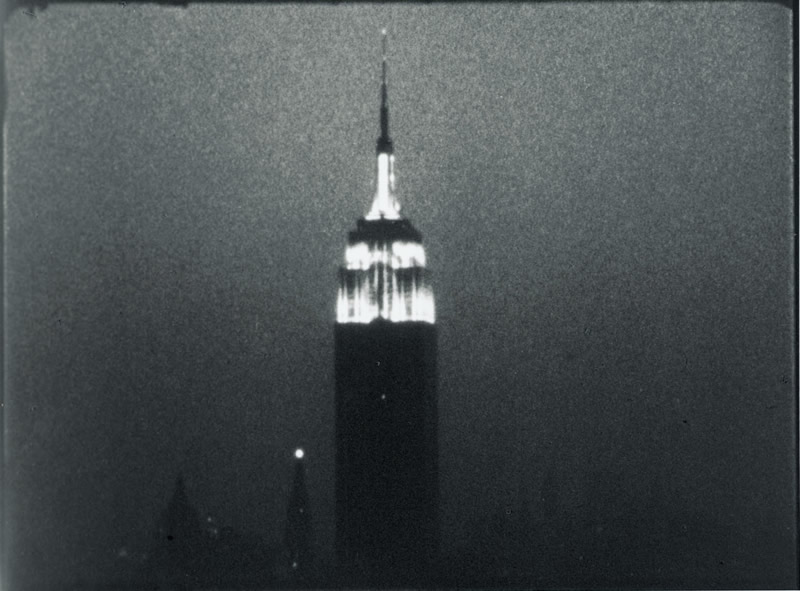It’s freezing in New York. I’m staying at the Gershwin, a mid-town hotel with imagination and rooms straight out of Raymond Chandler. This week they are having a Warhol festival, everyone gets a free silver wig and a pair of Wayfarer sunglasses. Suddenly the lobby is filled with mini Warhols, Blondie sings, Lou Reed waves and disappears, Bridget arrives late, in a night gown and a full length mink coat dispensing twenties to a waiting cab. All week there are two to three of Andy’s early black and white films running 24/7 on the lobby walls. When I come back from a dinner at the Waverly Inn, where a side of Macaroni and cheese costs fifty bucks, it’s two AM and on the wall beside me looms the Empire State building. I want to go to bed but instead I sit down before this icon and my brain floods with feelings about the past when daddy took us to the top of the tallest building in the world, about America, my tragic country that was great but is not great anymore, and about the city I can no longer afford to live in. All this only takes about three seconds because I promised myself a long time ago I would never cry in a hotel lobby, but the building continues to hang on the wall demanding my attention…unlike a painting it is not dead, it’s living, silently waiting like a window that sees only the past…dusk gathers around the building, real time caught in the test tube of film. The image seems fragile under the weight of time, the pressure of death, the image is me.
“This is brilliant,” I blurt out and four different people immediately tell me in no uncertain terms to shut the fuck up. But my brain is bubbling over, I’m either having a New York moment, or just waking up from the coma Los Angeles lovingly wraps you in, “Andy never meant to do a film, he was doing a painting. Pop art put the image back in painting, and Andy took it even farther and put the image on film instead of canvas. He wasn’t directing, he was painting.” And I’m talking to the night clerk…definitely time to go to bed.
I turn away only to be confronted with Kiss, a loop of two people kissing forever. It flickers on the wall dispelling the curse of the Grecian Urn where mortals must choose either before the kiss or after. Now the madness of the moment lives forever unable to tell us if it is heaven or hell. You cannot posses this image like you can a painting, you can only watch it. I remember when I first saw Kiss on the wall of the Dom behind the Velvets…as hypnotic as the twisting coils of a snake…the Velvets were singing Black Angel’s Death Song and Gerard started running my whip over his body and lips. I also remember when I later saw it on the wall of the factory. Billy Name had made a loop of the Janette’s only song, Sally Go Round the Roses, and played it with Kiss all night long, as strange pale people came and went and the next day never showed up. Great, it’s only taken me forty years to realize that these films were never meant to screen in a theater where I thought they were boring, they were meant to hang on a wall. They are Andy’s greatest paintings.
From the back of the lobby I hear my own voice. It’s a strange monotone. I don’t know what other people think, but I know my voice and I’m stalling for time in yet another weirdo Warhol movie. However when I see the young me on the screen, she is a stranger, a dark Alice in a demented Wonderland – she’s not really sure of where she is but the audience understands she is thier mirror. The movie Hedy Lamar stumbles across the wall but it works because it’s not a movie, it’s a performance just as Screen Tests aren’t screen tests, they are portraits, an artist’s attempt to capture someone’s soul. I stare at myself as I arrest Mario Montez for shoplifting. It ought to be hysterically funny but it’s not – it’s mesmerizing, vaguely uncomfortable, and a blatant refusal to follow the normal rules of entertainment. I am not acting, but I’m not being myself either. Like a tarantula I pick my way through the scene with no apparent motive – Why? Because it’s a performance piece. We were doing them all over the city then, and it was the third thing Andy decided to put on his canvas of film in an effort to stretch the boundaries of perception – a relatively simple progression except that film is not simple, among other religious aspects like a whole pantheon of gods and goddesses who can make you cry, laugh, or forget, it fucks with time, promises immortality and delivers her evil twin, fame, an ugly little animal with a huge appetite. One wonders why Andy stopped making his film paintings if they were so successful. Why did he return to making art the more normal way and pass the reins on to Morrissey, who wanted to make movies? Did he see something that scared him or did he see through everything and loose interest.
Artillery Magazine Vol 1 no. 5 May 2007
